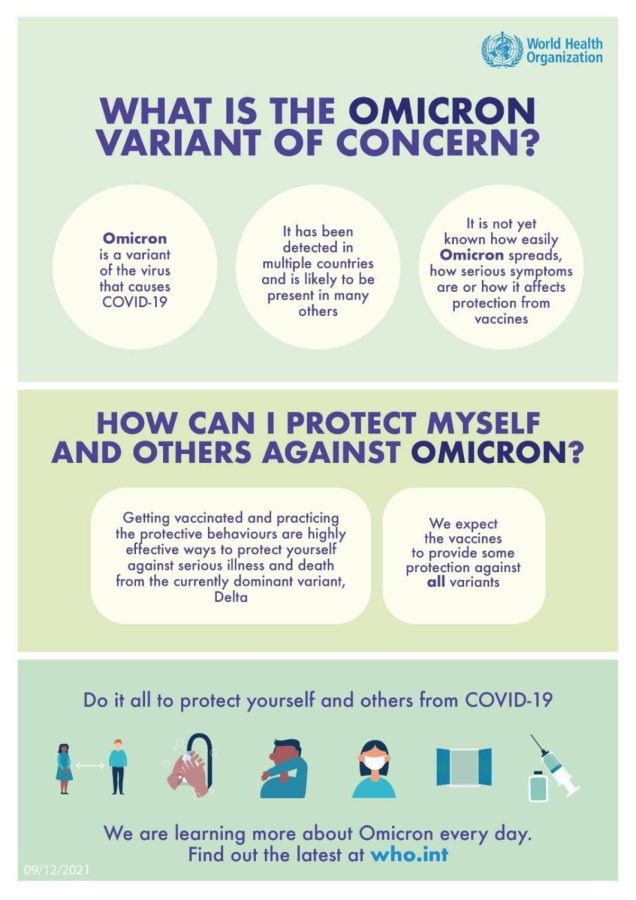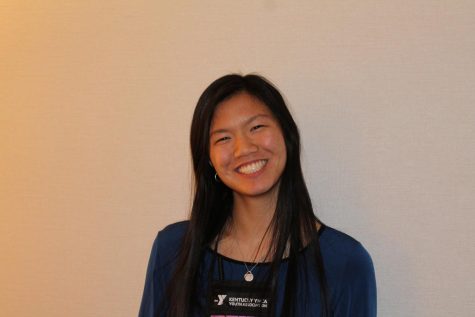Emergence of Omicron
February 7, 2022
On November 24th, the first omicron variant was reported in South Africa. The chair of the South African Medical Association, Dr. Angelique Coetzee, said that on Nov. 18th she saw a patient with symptoms that varied from those of the other COVID-19 strains. As she continued to see patients presenting similar symptoms, Dr. Coetzee decided to sound the alarm on this new variant.
The Omicron variant–named after the 15th letter in the Greek alphabet– has been monitored by the World Health Organization (WHO), along with other variants denoted by greek letters. In late 2020, WHO classified variants deeming them either Variants of Interest (VOI) or Variants of Concern (VOC). Through a global network, WHO has been able to identify and monitor 9 variants and hopes to facilitate multinational cooperation to address the pandemic. Omicron variant was first reported in South Africa, however many doubt it originated there.
The World Health Organization (WHO) has made further investigations into the variant, indicating that,”OMICRON shows multiple mutations, some of which suggest a higher risk of reinfection than other variants that are also of concern and warned that the number of cases is increasing in the African continent, where the vaccination rate is low, and at faster rates than previous infection bursts. ” This statement reflects a larger issue in the fight of COVID-19: lack of vaccine equity. Specifically on the African continent, vaccine rates have been slower due to the exclusion in the vaccine marketplace and distribution. In an article published on this issue, WHO said that most vaccine manufacturers have declined opportunities to share technology, despite the organization’s efforts. The emergence of a new variant is expected to emphasize the global importance of this issue.
Many health organizations other than WHO have released statements on Omicron. The Centers for Disease Control strengthened their recommendations for boosters of the vaccine, saying, ““The recent emergence of the Omicron variant (B.1.1.529) further emphasizes the importance of vaccination, boosters, and prevention efforts needed to protect against COVID-19.” Pfizer CEO, Albert Bourla, stated that, “The recent emergence of the Omicron variant (B.1.1.529) further emphasizes the importance of vaccination” in an interview with Anderson Cooper. Bourla also stressed that further research will be conducted to determine the current vaccine’s effectiveness against the variant, and that one targeting Omicron has already been produced. Moderna CEO, Stepháne Bancel, felt that the variant would affect the vaccine efficacy. Additionally, Moderna Chief Medical Advisor said that the company was testing the vaccine on the Omicron variant with concern.
After WHO announced that Omicron was in South Africa, as many as 68 countries decided to impose temporary travel bans to and from Southern Africa. The South African Health Minister claimed this as a “knee-jerk” reaction, with many Southern African countries feeling they are being punished for doing the right thing. Even WHO has voiced concerns over the stigma around countries being the first to report a new variant, stating, “it’s really critical that [reporting] continues, and that countries don’t feel that they will be penalized for reporting this information.”


